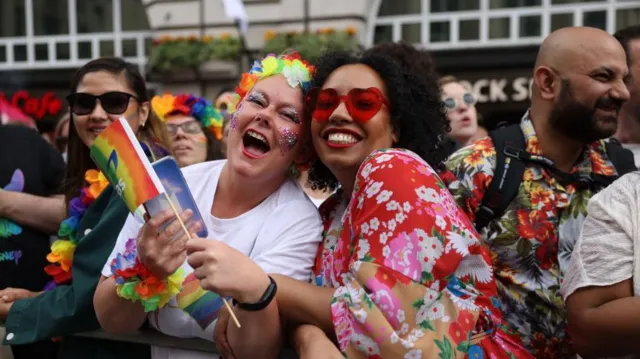Pride in London, the UK’s largest LGBTQ+ event, is anticipating over a million attendees this Saturday. However, organizers are sounding the alarm about the uncertain future of this significant celebration, as well as similar events across the country, due to a sharp decline in funding and a dwindling number of volunteers.
A recent survey by the UK Pride Organisers Network (UKPON), representing the majority of UK Pride events, revealed that more than 85 Pride organizations have experienced a reduction in corporate sponsorships and partnerships. This financial strain has forced some celebrations to be canceled or postponed, while others are scaling back their offerings or introducing ticket fees for events that were previously free to attend.
The roots of the UK’s Pride movement trace back to 1972, when the Gay Liberation Front (GLF) advocated for both protest and celebration of the LGBTQ+ community. In an era where public displays of affection between same-sex couples could lead to arrest, Pride events emerged as vital spaces for visibility and affirmation. Today, Pride events span the globe, blending powerful activism through marches and rallies with vibrant parties and entertainment.
Dee Llewellyn, the volunteer chair of UKPON and head of partnerships for Pride in London, points to a significant trend impacting these events: the global retreat from Diversity, Equity, and Inclusion (DEI) policies by major corporations. “There’s an old saying, if America sneezes, then the UK catches a cold, and I think we’re really feeling that right now,” Llewellyn stated. She explained that many international corporations, particularly those with headquarters in the U.S., have seen their DEI budgets cut. This has directly affected their ability to support Pride events, even those that have been long-standing partners in the UK.
Despite these challenges, Pride in London remains the UK’s largest Pride event, drawing an estimated 1.5 million attendees in recent years, making it one of the capital’s most significant public gatherings. The 2024 event alone incurred costs of £1.7 million, according to the Pride in London website.
The financial pressures are not confined to London. Pride events across the country are facing similar hurdles. UKPON reported that out of 112 organizations responding to a recent survey, over 85 experienced lost revenue from corporate sponsorships and partnerships this year. More than 40 reported a revenue drop of 26-50%, and 21 saw a decrease of over 50%. Additionally, over 60 organizations noted a reduction in grants from corporations or charities.
These financial difficulties have led to the cancellation of several Pride events. Liverpool City Region Pride, for example, announced in June that escalating costs and funding challenges made it impossible to proceed this year. Fortunately, another charity has stepped in to organize an alternative event for the city.
Alex MacDonald, chair of Plymouth Pride, shared the disappointment of canceling their event, which typically attracts 6,000-7,000 attendees. The organization faced an estimated £35,000 cost, with a shortfall of £12,000. MacDonald cited rising expenses for essential services like security, first aid, and sanitation, coupled with a decrease in grant funding, as the reasons for the cancellation. “I’m just absolutely gutted because I think it’s more important this year to have Pride than any other year,” he expressed.
While Plymouth Pride’s official event was canceled, a smaller group, Plymouth Community Pride, has successfully raised funds for an alternative community event. MacDonald remains optimistic: “We’ve been very lucky this year, the community rallied together and a separate organisation is putting on lots of little events. We’ll hopefully come back bigger and stronger next year.”
The decision to charge for tickets, as seen with Salford Pride’s “The Pink Picnic,” has become a difficult necessity for some events. This community-focused event, typically a quieter alternative to Manchester Pride, faced a £40,000 shortfall in corporate sponsorships for 2025. Consequently, a £5 ticket price was introduced, though the actual event cost is estimated at £18 per attendee.
Reece Holmes, event lead for Salford Pride, described the decision to charge as “one of the most difficult decisions” for the volunteer team, which unfortunately led to online abuse. Despite being a smaller event, The Pink Picnic’s annual running costs, including security and stewards, amount to approximately £100,000. Holmes noted a 28% increase in costs from 2024 and the loss of three corporate sponsors, attributing the shift partly to economic factors and a potentially hesitant political climate influencing corporate support for Pride events.
Despite the current financial challenges and the impact of reduced corporate partnerships, Dee Llewellyn remains resolute about the future of the Pride movement. “There’s no chance” Pride will cease to exist, she affirmed, emphasizing the community’s inherent resilience. “We have always been resilient and we always will be, so while we might go through this ebb and flow, and we’ve fallen off a cliff this year with corporate partnerships, we will find ways around that,” Llewellyn stated. “We are going to club together, stand together and be stronger and more united and we will come back stronger.”

